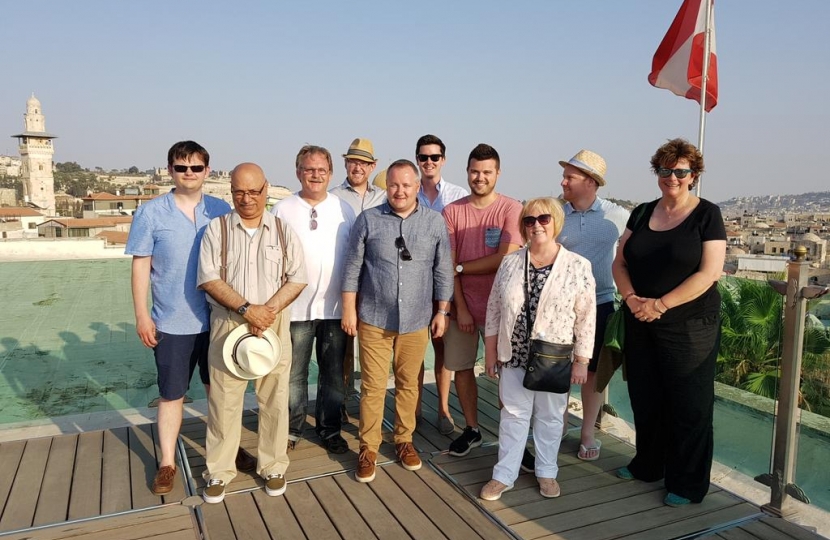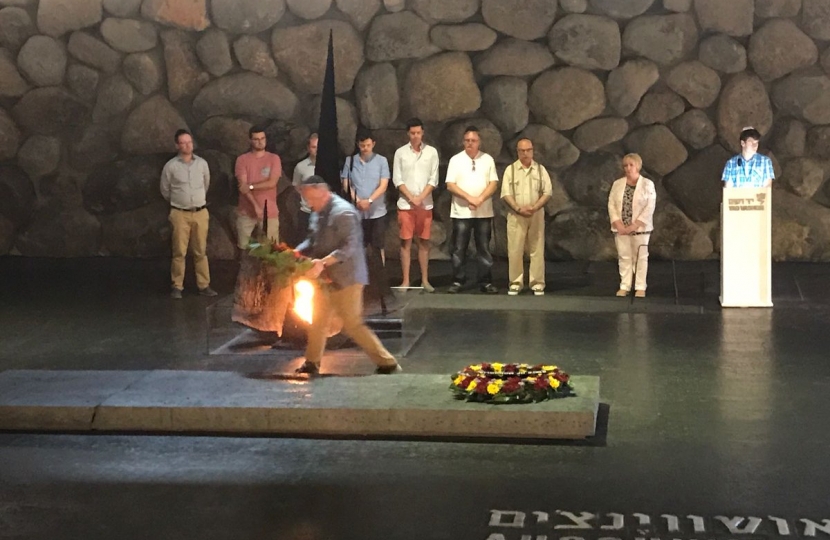During the 2017 summer recess, I had the great honour of leading a group of Welsh Conservative Assembly Members to Israel and the West Bank on the first visit of its kind in coordination with CFI.
The CFI trip came after Wales welcomed an Israeli business delegation visit, which has since led to significant Israeli investment in Wales, generating further job and business growth.
In our whistle-stop four-day visit we were given a fascinating introduction to this vibrant nation, and saw for ourselves that it is a country which in many respects is very different to the one portrayed in the news.
After a mere two hour drive from Tel Aviv, we found ourselves looking towards the deceptively peaceful mountain view along the Israel-Lebanon border. The reality of the situation facing Israel was only brought home with a glimpse of the infamous yellow flag of the Hezbollah terror group flying close by to one of the white armoured patrol vehicles of the United Nations Interim Force in Lebanon (UNIFIL). The UN force is supposedly there to prevent Hezbollah’s armed presence in the area.
An intelligence officer from the Israel Defense Forces briefed us that Hezbollah possesses an estimated 150,000 rockets hidden in civilian villages throughout southern Lebanon. These Iranian-supplied missiles are reportedly capable of hitting any point in Israel, and represent an enormous increase on the number the group possessed in the 2006 Lebanon War. Hezbollah’s combat capabilities are also said to be much-improved as a consequence of their experience fighting in support of Bashar al-Assad in Syria.
Bogged down in Syria, Hezbollah doesn’t appear ready to initiate a conflict with Israel at this stage, but one can’t help but feel that any future war is likely to have devastating consequences for those involved.
The delegation also climbed Mount Bental in the Golan Heights, next to the fantastically named restaurant - Coffee Annan – where we saw the peculiar sight of Israeli and international tourists peering towards the bloody civil war in Syria.
United Nations peacekeepers from the UN Disengagement Observer Force (UNDOF) maintain a permanent position at the summit of the mountain from which they look through their high-powered binoculars and telescopes into Syrian territory, as part of their efforts to monitor the four-decade truce between Israel and Syria.
In Jerusalem, we toured the ambulance dispatch centre of Magen David Adom; Israel’s national emergency medical service. Here we were introduced to the smartphone application that is revolutionising emergency services in Israel. The app, which is available to all Israelis, enables users to provide medical dispatchers with live feeds of any given emergency scene who can then relay possibly life-saving medical instructions before emergency responders arrive. It also gives medics immediate access to a full medical history of each patient, and the MDA’s volunteer first responders can be GPS-located to enable the MDA to despatch the closest possible medic to a patient at any given time.
There is much that the Welsh NHS can learn from the innovations in emergency care which are saving precious minutes in Israel and making the difference between life and death for patients.
We also took time in Jerusalem to participate in a moving Act of Remembrance for victims of the Holocaust at Yad Vashem, Israel’s Holocaust Museum and National Memorial.
From meetings with high-profile Knesset Members, Ya’akov Peri (Yesh Atid) and Michael Oren (Kulanu), and the Israel Britain Chamber of Commerce, through to a briefing in Ramallah with Xavier Abu Eid of the Palestine Liberation Organisation’s Negotiations Support Unit, the group had access to some of the key players in the region.
These meetings explored and debated all of the key issues in an open way, and the delegation didn’t shy away from asking tough questions on issues such as settlements, the security wall/fence and human rights.
We left Israel better informed about the complex relationship between Israel and its neighbours and the reality of the challenges ahead, but we were also encouraged by opportunities which exist to develop positive relationships between our two nations which can support economic development, dialogue and friendships between Wales and this special part of the world.




